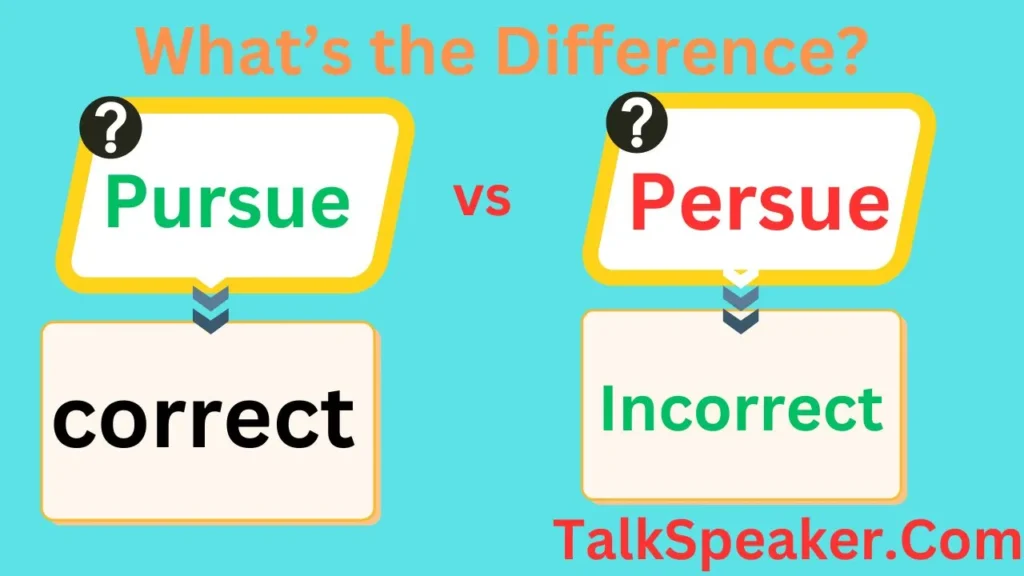Last updated on December 31st, 2024 at 07:44 am
Confusion between “pursue” and “persue” is common, but understanding the difference is crucial for effective communication.
This comprehensive guide will clear up the confusion, offering a deep dive into the correct spelling, usage, and evolution of the word “pursue.”
The correct spelling is “pursue”, not “persue,” and it means to chase or strive for something, both literally and figuratively.
Confused between “pursue” and “persue“? Our guide clears it all up! Learn the correct spelling, discover why “persue” is incorrect, and gain tips to remember “pursue” easily.

Enhance your writing and confidently use “pursue” in any context—whether you’re chasing dreams or just curious about word origins. Dive in and pursue perfect spelling today!
pursue vs persue meanings
What’s the Difference?
The primary issue stems from a phonetic similarity: “pursue” and “persue” sound alike, leading many to mix them up.
The correct term is “pursue”. The confusion often arises because:
- Phonetic Similarity: Both words sound almost identical when spoken.
- Spelling Variations: English spelling can be tricky, and words that sound the same but have different spellings can easily be mixed up.
Examples of common mistakes include:
- Incorrect: “She will persue her goals with determination.”
- Correct: “She will pursue her goals with determination.”
Examples of Incorrect Usage
Incorrect usage often appears in casual writing and digital communications. Here are a few instances:
- Misused in a Blog Post: “The team decided to persue a different strategy.”
- Misused in Social Media: “I’m planning to persue my dreams of becoming a writer.”
Breaking Down the Correct Spelling: Pursue
Etymology of “Pursue”
The word “pursue” originates from the Latin verb “pursuere,” which means “to follow after.” It entered Middle English as “pursuen,” eventually evolving into the modern spelling.
Spelling Rules
To remember the correct spelling:
- “Pursue”: Always with a single “s” and double “u”—think of pursuing a goal where the “s” is singular and the “u” is double, like chasing a pair of dreams.
- Common Mnemonics: “Pursue” contains “sue,” which can be remembered as following up or continuing an action.
The Definition and Use of Pursue in American English
Dictionary Definitions
According to major dictionaries:
- Merriam-Webster: “To follow in order to overtake, capture, kill, or defeat” or “to go after with intent to attain.”
- Oxford English Dictionary: “To follow or chase with intent to catch or attain.”
Contextual Usage
Pursue can be used in various contexts:
- Legal Context: “The lawyer decided to pursue legal action against the defendant.”
- Personal Goals: “She is determined to pursue her passion for painting.”
- Professional: “The company aims to pursue new markets for expansion.”
Literally Chasing: Pursue in Action
Concrete Examples
Here’s how “pursue” is used in real-world scenarios:
- Law Enforcement: “The police pursued the suspect through the streets.”
- Sports: “The athlete pursued the record with intense training.”
Sentence Examples
- Literal Use: “The cat pursued the mouse across the yard.”
- Professional Context: “The investigator pursued all leads to solve the case.”
Metaphorically Chasing Dreams: Pursue in Ideals
Figurative Uses
When used metaphorically, “pursue” describes the chase of abstract goals or ambitions:
- Personal Aspirations: “He pursued his dream of becoming an astronaut despite numerous challenges.”
- Creative Goals: “The artist pursued new techniques to innovate her style.”
Sentence Examples
- Metaphorical Use: “She continues to pursue her dream of writing a novel.”
- Ideals: “The company’s vision is to pursue sustainability in all its operations.”
Hints to Remember the Spelling
Memory Aids
To avoid confusion, use these tips:
- Think of Pursuing Goals: “Pursue” has a single “s” as goals are singular and specific.
- Visual Mnemonics: Picture a “purse” with a single strap—both words share the same “u” and “s” structure.
Common Misconceptions
- Myth: “Persue” is an acceptable alternative. Fact: “Persue” is incorrect and outdated.
Examining the Obsolete Spelling: The Evolution of Pursue
Historical Perspective
The spelling “persue” was used historically but fell out of favor due to standardization of English spelling:
- Early Usage: In older texts, you might find “persue” as a variant.
- Modern Standard: Today, “pursue” is the accepted form, reflecting a standardized approach to English spelling.
Language Evolution
Language evolves to simplify and standardize usage. The shift from “persue” to “pursue” aligns with this trend, reflecting changes in linguistic practices.
Struggling with English? Elevate your skills with our expert guides and tips—unlock your potential At Talk Speaker!
When to Use Pursue in Your Writing
Practical Application
“Pursue” should be used when referring to:
- Following or Chasing: Whether literal or metaphorical.
- Determined Efforts: Any effort directed towards achieving a goal.
Common Mistakes to Avoid
- Incorrect: “He is persuing his career goals.” (Should be: “He is pursuing his career goals.”)
- Incorrect: “The team decided to persue a different strategy.” (Should be: “The team decided to pursue a different strategy.”)
Pursue: Its Role in Literature and Famous Quotes
Literary Usage
“Pursue” appears frequently in literature, often symbolizing the quest or journey:
- Example from Literature: “To pursue happiness is to strive for a fulfilling life.” – Adapted from various literary sources.
Notable Quotes
- William Shakespeare: “The better part of Valour, is Discretion; in the which better part, I have saved my life.” – This quote reflects the theme of pursuing wisdom over rash bravery.
- Helen Keller: “Keep your face to the sunshine and you cannot see a shadow. It’s what we don’t pursue that defines us.”
People Question
What is the correct spelling—pursue or persue?
The correct spelling is “pursue.” “Persue” is incorrect.
Why do people confuse pursue and persue?
The confusion arises from their similar pronunciation and tricky English spelling.
What does pursue mean?
“Pursue” means to follow or chase with intent to attain, capture, or achieve something.
Is persue ever correct?
No, “persue” is not used in modern English and is considered an incorrect spelling.
Can pursue be used both literally and figuratively?
Yes, “pursue” can describe both physical chases and the pursuit of goals or dreams.
Conclusion
Understanding the correct spelling and usage of “pursue” enhances clarity in both written and spoken communication.
By adhering to the correct spelling and applying the tips and examples provided, you can confidently use “pursue” in all contexts.
Summary of Key Points
- Pursue is the correct spelling, not “persue.”
- It can be used both literally and metaphorically.
- Use mnemonics and memory aids to remember the correct spelling.
Call to Action
Apply these insights in your writing and practice using “pursue” correctly. Whether in professional documents, creative works, or daily communication, mastering this term will refine your language skills.
Students can customize word pens of different difficulty and themes according to their learning progress and interests, such as basic vocabulary, professional terms, common phrases, etc., to make learning more personalized and targeted. Since the Custom Pens is a frequently used tool in daily learning, every time the pen is used, the words on the pen will be unconsciously seen.
This unconscious repeated exposure helps to consolidate memory and make the words more deeply rooted in the mind. Having their exclusive word pen can stimulate students’ interest and motivation in learning, because they will feel that this is a symbol of their hard work, and thus they will be more actively involved in learning.

As an experienced English teacher, I’m Jessica Thompson, here to make grammar and vocabulary simple and fun. Join me on TalkSpeaker as we explore the language together, one lesson at a time!



